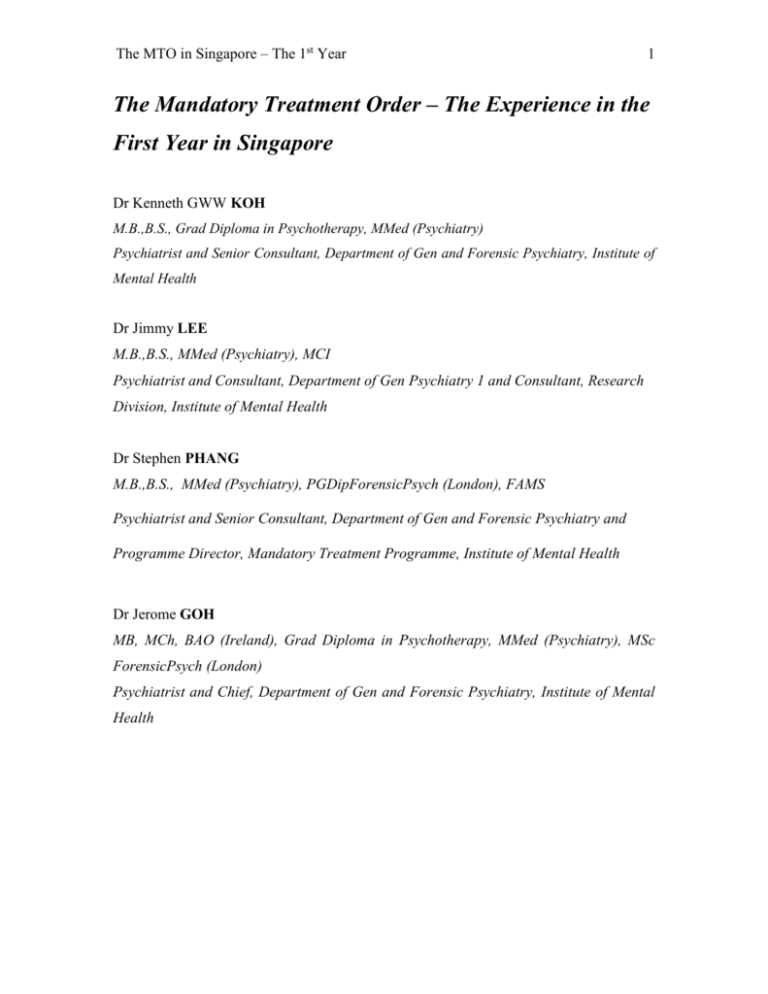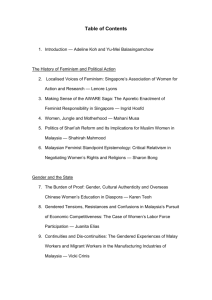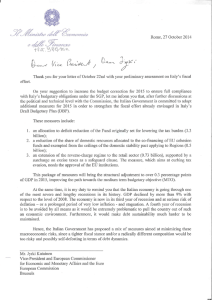136-436-1-RV - ASEAN Journal of Psychiatry
advertisement

The MTO in Singapore – The 1st Year 1 The Mandatory Treatment Order – The Experience in the First Year in Singapore Dr Kenneth GWW KOH M.B.,B.S., Grad Diploma in Psychotherapy, MMed (Psychiatry) Psychiatrist and Senior Consultant, Department of Gen and Forensic Psychiatry, Institute of Mental Health Dr Jimmy LEE M.B.,B.S., MMed (Psychiatry), MCI Psychiatrist and Consultant, Department of Gen Psychiatry 1 and Consultant, Research Division, Institute of Mental Health Dr Stephen PHANG M.B.,B.S., MMed (Psychiatry), PGDipForensicPsych (London), FAMS Psychiatrist and Senior Consultant, Department of Gen and Forensic Psychiatry and Programme Director, Mandatory Treatment Programme, Institute of Mental Health Dr Jerome GOH MB, MCh, BAO (Ireland), Grad Diploma in Psychotherapy, MMed (Psychiatry), MSc ForensicPsych (London) Psychiatrist and Chief, Department of Gen and Forensic Psychiatry, Institute of Mental Health The MTO in Singapore – The 1st Year Correspondence to: Dr Kenneth GWW Koh Institute of Mental Health / Woodbridge Hospital 10 Buangkok View Singapore 539747 Tel: +65 6389 2000 Fax: +65 6385 1051 Email: kenneth_koh@imh.com.sg Statistical Summary of Manuscript Total no of words: 2667 Total number of words in abstract: 60 No of references: 10 No of tables: 2 No of figures: Nil Conflicts of Interest : None Sources of External Funding: None 2 The MTO in Singapore – The 1st Year 3 Abstract The Mandatory Treatment Order (“MTO”) became a sentencing option for select offenders with psychiatric illness in 2011. This article highlights the psychiatric characteristics of the offenders in the first year of the MTO. Gender differences were noted in those who were granted MTOs and some discussion is made as to future research and directions for diversion of mentally disordered offenders. The MTO in Singapore – The 1st Year 4 I. Introduction 1 The Criminal Procedure Code (2010) was passed by the Parliament of Singapore on 19th May 2010 and assented to by the President on 10th June 2010. It was operationalised on 2 January 2011 and replaced the older Criminal Procedure Code (cap 68). A significant change to the new CPC (2010) [1] was the inclusion of the Mandatory Treatment Order (MTO) as a sentencing option. 2 Under section 339 of the act, offenders with treatable mental illnesses may now be ordered by the Court to receive compulsory psychiatric treatment instead of a custodial sentence when it is determined that their mental illness is amenable to treatment and has contributed significantly to their offending. Prior to the sentencing, the offender is assessed by a psychiatrist, who is appointed by the Director of Medical Services of Singapore under section 339 (13) of the CPC 2010. As of the end of the study period, there were 43 Appointed Psychiatrists, all of whom practice at the Institute of Mental Health, Singapore. 3 For the purpose of obtaining the report from an Appointed Psychiatrist, the Court may order that an offender (a) be remanded for observation in a psychiatric institution for a period or periods, not exceeding 3 weeks in the case of any single period, or (b) attend at a psychiatric institution for assessment to enable the report to be submitted by the Appointed Psychiatrist. 4 Upon receipt of a request by the Court for such an assessment, the Appointed Psychiatrist, usually together with a medical social worker and a case manager, examines the accused person to determine if he has a mental illness and if this was significantly contributory to the offence(s). Where this has been satisfied, an assessment is then made as to the treatability of the illness, including the subject’s likely compliance to treatment and how significant others may act to aid in adherence to treatment plans and in providing other forms of social support, as needed. When the Appointed Psychiatrist is The MTO in Singapore – The 1st Year 5 satisfied that an MTO is viable, he makes a written report to the Court, outlining the management and recommending the duration of the MTO. 5 The MTO may only apply to certain offences. A court shall not make any MTO in respect of (a) an offence for which the sentence is fixed by law; (b) an offence for which a specified minimum sentence or mandatory minimum sentence of imprisonment or fine or caning is prescribed by law; (c) an offence which is specified in the Third Schedule to the Registration of Criminals Act (Cap. 268); (d) a person who had previously been detained or subject to police supervision under section 30 of the Criminal Law (Temporary Provisions) Act (Cap. 67); (e) an offence which is punishable with a fine only; or (f) an offence which is punishable with a term of imprisonment which exceeds 3 years. 6 The Court may then impose an MTO not exceeding 24 months. In addition, the Court may also make one or more other community orders, including a day reporting order; a community work order; a community service order; or a short detention order. 7 An offender in respect of whom a mandatory treatment order is in force shall be required to (a) attend the treatment sessions on such day and time and at such place as the Appointed Psychiatrist may require; (b) comply with such other conditions in connection with his treatment as the appointed psychiatrist may require; and (c) comply with such other conditions which a court may impose. 8 In practice, this usually entails a combination of the adherence to medication (oral and/or depot), regular consultations with the psychiatrist, psychotherapy sessions, family or marital therapy and attendance at occupational rehabilitation. All offenders under the MTO will have a case manager assigned. This case manager tracks the patient by means of phone calls and, at times, house visits. Case managers build rapport with patients, seeking to aid not only in their compliance to appointments and medication, but also in negotiating rehabilitation in the community. The MTO in Singapore – The 1st Year 9 6 Should the offender breach any of the conditions of the MTO, the Appointed Psychiatrist may report this to the Court and the order may be revoked, and a prison sentence imposed. The MTO in Singapore – The 1st Year 7 II. Methods 10 A clinical audit was conducted on all the cases referred to IMH for assessment as to their suitability to receive an MTO in the first year from January to December 2011. Data on the demographics, forensic history and psychiatric diagnoses were obtained from records. The MTO in Singapore – The 1st Year 8 III. Results 11 One hundred and fourteen cases were referred for assessment in the first year, with 72 (63.2 %) being granted MTOs. The mean age of all cases referred was 40.9 (SD 12.1) years old. There were no significant differences in the age or ethnic distribution between the group granted and the group denied the MTO. However, there was a significant difference (P = 0.006) in preference of females being granted MTOs. 82.4% of females and 55.0% of males were granted the MTOs. Most MTO cases were dealt with expediently, with the median time from the referral by the Court, to the psychiatrist’s assessment, to the decision on the MTO being 28 days (with a range of 6-56 days). 12 Table 1 displays the characteristics of the group granted MTOs. MTOs granted ranged from 6 months to the maximum allowable duration of 24 months. Fifty-three (73.6%) subjects received the maximal duration (see table 1). Eleven (15.3%) of the 72 granted MTOs had never seen a psychiatrist before. Thirteen (18.1%) of the group granted MTOs had a co-morbid psychiatric diagnosis. Table 1. Characteristics of offenders granted MTO MTO Granted n=72 Age in years 39.7 (9.9) Gender, n(%) Male 44 (61.1) Female 28 (38.9) Ethnicity, n(%) Chinese 56 (77.8) Malay 8 (11.1) Indian 8 (11.1) Duration of MTO in months, n(%) 6 2 (2.8) 9 3 (4.2) The MTO in Singapore – The 1st Year 9 12 12 (16.7) 18 2 (2.8) 24 53 (73.6) Type of current offence, n(%) Theft 32 (44.4) Minor sexual 12 (16.7) Miscellaneous 22 (30.6) Violence against persons 11 (15.3) History of previous convictions, n(%) 42 (58.3) Contributing Psychiatric Diagnosis, n(%) Psychotic illness 30 (41.7) Depression 23 (31.9) Bipolar disorder 3 (4.2) Paraphilia 11 (15.3) Others* 8 (11.1) Treatment modalities, n(%) Medication 67 (93.1) Individual Psychotherapy 19 (26.4) Marital/Family therapy 4 (5.6) Residential stay 2 (2.8) Occupational therapy 3 (4.2) *3 offenders had additional contributing psychiatric diagnoses 13 There were gender differences observed in MTOs granted (Table 2). Males were significantly more likely to receive a MTO with a longer duration (p = 0.029). Minor sexual offences were only committed by males. Twenty-one (75.0%) out of the 28 females committed theft. Most of the females granted MTO (60.7%) suffered from depression, whilst the commonest psychiatric diagnosis in the male group was psychotic illnesses (52.3%). Medication was the mainstay of treatment for most of the MTO The MTO in Singapore – The 1st Year 10 recipients, with 93.1% (n = 67) being on pharmacotherapy. Nineteen patients were also referred for psychotherapy. Table 2. Gender differences amongst offenders granted the MTO Male Female N=44 N=28 Duration of MTO, n(%) P value 0.029 6 2 (4.5) 0 9 0 3 (10.7) 12 6 (13.6) 6 (21.4) 18 0 2 (7.1) 24 36 (81.8) 17 (60.7) Theft 11 (25) 21 (75) <0.001 Minor sexual offences 12 (27.3) 0 0.002 Violent offences against persons 9 (20.5) 2 (7.1) 0.182 Miscellaneous minor offences 16 (36.4) 6 (21.4) 0.202 26 (59.1) 16 (57.1) 0.870 Type of offence, n(%) Previous convictions, n(%) Contributing psychiatric Diagnosis, n(%) < 0.001 Psychotic illness 23 (52.3) 7 (25.0) Depression 6 (13.6) 17 (60.7) Bipolar disorder 3 (6.8) 0 Paraphilia 11 (25.0) 0 Others 1 (2.3) 4 (14.3) 14 The reasons for the 42 not granted MTO were noted. Five (11.9%) did not suffer from a mental illness. Twelve (28.6%) had a mental illness that was assessed to be not linked to the offence. Sixteen (38.1%) had a mental illness that was assessed to be untreatable. Sixteen (38.1%) had inadequate social support, and 16 (38.1%) were The MTO in Singapore – The 1st Year 11 assessed to be unlikely to comply with the requirements of the MTO. Some offenders had multiple reasons for their being found unsuitable. The MTO in Singapore – The 1st Year 12 IV. Discussion 15 Some interesting trends were seen in this audit. Males were more likely to get longer MTOs than females. When we explored the duration of MTOs by psychiatric diagnoses, we found that 27 out of 30 (90%) with psychotic illnesses, and all of those with bipolar disorders received the maximum 24 months MTO duration. Three in four with a diagnosis of psychotic illness, and all patients with bipolar disorder in this sample were males. Therefore, it would not be surprising to find that males had longer MTO durations. Psychotic illnesses and bipolar disorders tend to be more chronic and debilitating than depressive disorders and generally require lifelong treatment [2]. The assessing psychiatrists are therefore more likely to recommend the maximal MTO duration for cases with psychotic and bipolar disorders so that these receive the longest possible period of compelled treatment, without which compulsion they would be more prone to default, relapse and then potentially offend again. 16 When we further explored the duration of MTO by type of offence, we found that almost all convicted of violent offences against persons and the majority of sexual offenders were also given the maximum MTO duration. Table 2 revealed that males formed the majority of violent offenders and all sexual offences were committed by males. Therefore, we posit that males received longer MTOs based on their psychiatric diagnoses and offences committed. 17 Although we found that females were more likely to be granted MTOs compared to males, the small sample of 6 females limited our ability to draw properly meaningful conclusions. This finding therefore should be interpreted with caution. Literature has shown, however, that females with psychotic illnesses are less likely to deteriorate socially as much as males [2,3], as they more frequently continue to reside with their families of origin and therefore have more social support. Female psychotic patients are therefore more likely to receive an MTO as they would be less likely to be found to be lacking in social support or be deemed unlikely to comply with MTO requirements. The MTO in Singapore – The 1st Year 13 18 The law in Singapore has long recognised that prison sentences are not always the most appropriate means of dealing with certain groups of offenders. Youth offenders, for instance, have long had access to probation as a form of alternate sentencing. The past few years have seen an even greater awareness of the necessity to establish specialist courts to deal with special groups of offenders, including mentally ill individuals. To that effect, the Community Court was established in 2006 to manage (a) youthful offenders (aged 16 to 18); (b) offenders with mental disabilities; (c) neighbourhood disputes; (d) attempted suicide cases; (e) family violence cases; (f) carnal connection offences committed by youthful offenders; (g) abuse and cruelty to animals; and (h) cases which impact on race relations issues [4]. 19 In Singapore, The Honourable The Chief Justice Chan Sek Keong, in his keynote address at the 2011 Subordinate Courts Workplan, announced new directions in the treatment of certain categories of offenders. Mandatory Treatment Orders, among other community sentences were means to calibrate the punishments to fit the crime and the offender. These took into account the nature and gravity of the offence, and the character of the offender, having regard to his age and/or mental capacity. In the Chief Justice’s words, “this gave life to a principle of criminal justice that is more humane, therapeutic, beneficial, humanistic, healing, restorative, curative, collaborative and comprehensive [5].” 20 Special legal regulation governing mentally disordered prisoners is not a new phenomenon, having been the practice in many countries for decades in some instances [6]. Mental Health Courts are now widespread across the United States as a form of diversion for justice-involved individuals with mental illness [7]. In Australia, methods of diversion include magistrates courts diversion programmes, psychiatric court liaison services and legislative powers of diversion [8]. 21 Ongoing research into the efficacy of court diversion programmes is crucial. Knowing the profiles of offenders who are most likely to comply with court directives The MTO in Singapore – The 1st Year 14 can aid assessors in making more informed recommendations regarding court diversion and thereby allow for resources to be most appropriately allocated. 22 At the moment, in Singapore, court diversion in the form of an MTO, only takes place after there has been a conviction. In other countries, where court diversion is more established, pre-trial diversion is sometimes employed. Some jurisdictions in the United States train Specialty Police Units to channel persons with mental illness out of the criminal justice system and into mental health treatment [9]. In Canada, prosecutors may use their discretion to drop criminal proceedings against mentally disordered persons on the condition that such persons be certified and detained for treatment in a hospital setting [10]. As Singapore evolves and improves its legislature, such pre-trial diversion may become a viable alternative too. 23 The present paper looked at the characteristics of those who received MTOs in Singapore in the first year since its inception. A more thorough evaluation of the success of the programme is not fully possible yet, given its early days. Subsequent audits will look at relapse and recidivism rates of individuals on a longer term during and after completion of their MTOs and also at the characteristics of those who breach their orders. The MTO in Singapore – The 1st Year 15 References 1. Part XVII, Sect 339, Criminal Procedure Code, Chapter 68 (Revised Edition 2012) of the Singapore Statutes. 2. McGlashan TH, Bardenstein KK. Gender differences in affective, schizoaffective, and schizophrenic disorders. Schizophrenia Bulletin, Vol 16(2), 1990, 319-329. 3. Versola-Russo JM. Cultural and Demographic Factors of Schizophrenia. Int J of Psychosocial Rehabilitation. 10 (2), 89-103 4. Keynote Address By The Honourable The Chief Justice of Singapore, Chan Sek th Keong. 15 Subordinate Courts Workplan 2006/2007 5. Keynote Address By The Honourable The Chief Justice of Singapore, Chan Sek Keong. Subordinate Courts Workplan 2011 6. Konrad N, Lau S. Dealing with the mentally ill in the criminal justice system in Germany. Int J Law Psychiatry 2010; Sep-Oct; 33(4): 236-40. 7. Callahan L, Steadman HJ, Tillman S, Vesselinov R. A Multi-Site Study of the Use of Sanctions and Incentives in Mental Health Courts. Law Hum Behav; 2012 May 7. [Epub ahead of print]. 8. Richardson E, McSherry B. Diversion down under - Programs for offenders with mental illnesses in Australia. Int J Law Psychiatry 2010; Sep-Oct; 33(4): 249-57. Epub 2010 Jul 23. The MTO in Singapore – The 1st Year 16 9. Grudzinskas AJ Jr, Clayfield JC, Roy-Bujnowski K, Fisher WH, Richardson MH. Integrating the criminal justice system into mental health service delivery: the Worcester diversion experience. Behav Sci Law 2005; 23(2): 277-93. 10. Davis S. Factors associated with the diversion of mentally disordered offenders. Bull Am Acad Psychiatry Law 1994; 22(3): 389-97.






